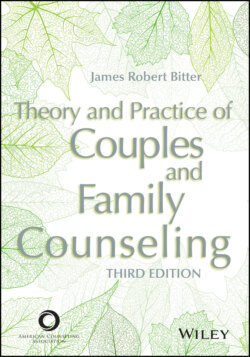Читать книгу Theory and Practice of Couples and Family Counseling - James Robert Bitter - Страница 67
CHAPTER 3
The Couples and Family Practitioner as Person and Professional
ОглавлениеIn the fields that engage in family practice, it is really impossible to separate the person from the professional. Every part of becoming a family counselor requires you to engage in new ways of thinking, seeing, and conceptualizing. Personal reflection is a constant part of being fully human and present with your clients. Systemic theories and interventions are certainly important, but being able to form and maintain an effective therapeutic relationship is more important than any of the other skills you will acquire (Blow et al., 2007; Carlson et al., 2005). I talk about some of the qualities and traits that seem to facilitate constructive relationships in family practice later in this chapter. Most of these qualities can be learned, but they work best when they are fully integrated into the practitioner’s way of being.
Family counselors simply cannot divorce who they are from the work they do. Like everyone else in life, we have triggers, buttons that seem to get pushed regularly and that bring out the kinds of automatic responses that sometimes leave us asking, “Wow, what was that?” Such automatic responses usually come from unmet needs, unconscious motivations, challenged values or personality traits, or unfinished business, especially unfinished business with our family of origin. Our choice is either to be aware of our family issues and concerns or not. When we try to ignore our own issues and concerns, they commonly reemerge in counseling as emotional reactivity (or countertransference), strong positive or negative feelings that are triggered automatically. Such automatic responses are usually not helpful when working with families. They lack clarity and authenticity. We are left to ask, “With whom is the practitioner working: the family in front of them, themselves, or their own family of origin?” If you are going to choose a profession in family counseling, it will also be important to be open to self-evaluation, to expanding your awareness of your own family experiences and the meaning associated with them, and to the personal development of what Murray Bowen called a differentiated self. You will have to learn to recognize what triggers you, to challenge the automatic responses you have to old issues and concerns, and to find alternatives to the emotional reactions that have been with you for a long time. Choosing to become a professional family practitioner is also choosing to work on and develop yourself as a person.
